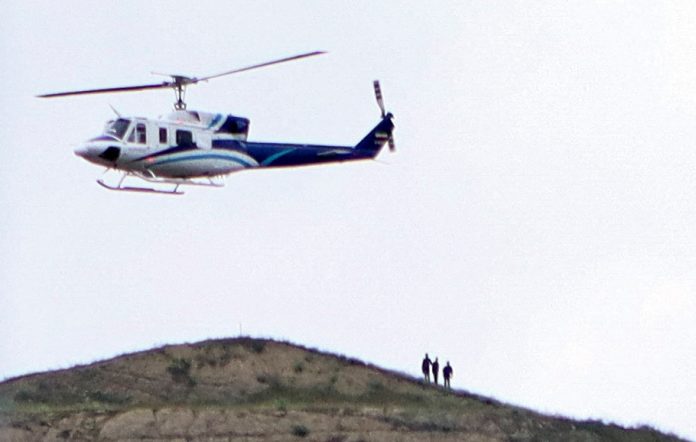
By Gerry Doyle
May 20 (Reuters) – The helicopter that crashed in Iran on Sunday, killing the country’s president and foreign minister in mountain fog, was a Bell 212 model, Iranian state media reported.
For all clueless Westerners sending condolences in connection with y-day’s death of Islamic regime President Ebrahim Raisi
He conducted thousands of “5 minute trials” in the 1980s & sentenced 5000 innocent Iranians to death
He’s known as “The Butcher of Tehran”
Via @NiohBerg pic.twitter.com/nxJqugbX07
— Visegrád 24 (@visegrad24) May 20, 2024
A civilian version of the ubiquitous Vietnam War-era UH-1N “Twin Huey,” such helicopters are in wide use globally by both governments and private operators:
WHAT ARE THE HELICOPTER’S ORIGINS?
Bell Helicopter (now Bell Textron, a division of Textron Inc TXT.N) developed the aircraft for the Canadian military in the late 1960s as an upgrade of the original UH-1 Iroquois. The new design used two turboshaft engines instead of one, giving it greater carrying capacity. The helicopter was introduced in 1971 and was quickly adopted by both the United States and Canada, according to U.S. military training documents.
WHAT ARE ITS USES?
As a utility helicopter – the UH in its military designation represents those words – the Bell 212 is meant to be adaptable to all sorts of situations, including carrying people, deploying aerial firefighting gear, ferrying cargo and mounting weapons.
The Iranian model that crashed on Sunday was configured to carry government passengers. Bell Helicopter advertises the latest version, the Subaru Bell 412, for police use, medical transport, troop transport, the energy industry and firefighting. According to its type certification documents with the European Union Aviation Safety Agency, it can carry 15 people, including the crew.
WHICH ORGANISATIONS OPERATE THE HELICOPTER?
Non-military organisations that fly the Bell 212 include Japan’s Coast Guard; law enforcement agencies and fire departments in the United States; Thailand’s national police; and many others. It is not clear how many Iran‘s government operates, but its air force and navy have a total of 10, according to FlightGlobal’s 2024 World Air Forces directory.
Iran was a major purchaser of Bell and Agusta helicopters under the Shah, becoming the Middle East’s largest military helicopter power, according to Western reports.
Iran‘s current fleet includes an Italian-built naval version, the Agusta Bell AB-212, according to IISS.
The exact origin of the helicopter involved in the crash was not confirmed but an Iranian source said it was connected to the Islamic Republic Red Crescent Society. Experts said the few details available suggested it may be 40 to 50 years old.
HAVE THERE BEEN OTHER INCIDENTS INVOLVING THE BELL 212?
The most recent fatal crash of a Bell 212 was in September 2023, when a privately operated aircraft crashed off the coast of the United Arab Emirates, according to the Flight Safety Foundation, a non-profit focusing on aviation safety.
The most recent Iranian crash of the type was in 2018, killing four people, according to the organisation’s database. In 2015, the same database cited reports that a helicopter believed to be an AB-212 had crashed near Kashan, killing three.
IRANIAN AVIATION
Iran has kept its civil and military aviation fleets flying during its isolation since the 1979 revolution through a combination of smuggled parts and reverse-engineering, according to Western analysts and people who spoke about the trade following a nuclear deal later abandoned by Washington.
Its state-owned helicopter services and renovation company, widely known as PANHA, has presented indigenous models said by Western analysts to be based on re-engineered Bell aircraft, though the 212 is not one of the models said to be involved.
“Iran has a reputation for strong technical competence when it comes to aviation,” said Cirium Ascend analyst Paul Hayes.
WILL THERE BE AN INVESTIGATION?
As a domestic state flight, the accident does not automatically fall under global rules for air accident probes.
Middle East and aviation safety analysts say there is little chance Iran would turn to outside help for such a politically sensitive matter on its own territory.
Iran sent black boxes to France following the downing of a Ukrainian airliner in 2020, but the role of the French BEA was limited to reading recorders and not investigation or analysis.
“I doubt whether there will be an investigation at all,” Hayes said, noting the sensitivity of the matter.
(Reporting by Gerry Doyle, Additional reporting by Tim Hepher, Parisa Hafezi; Editing by Neil Fullick and Christina Fincher)

